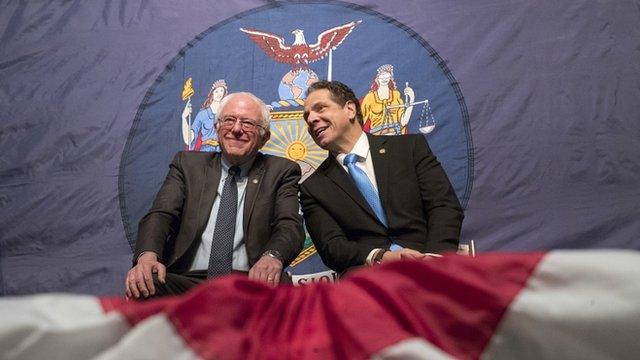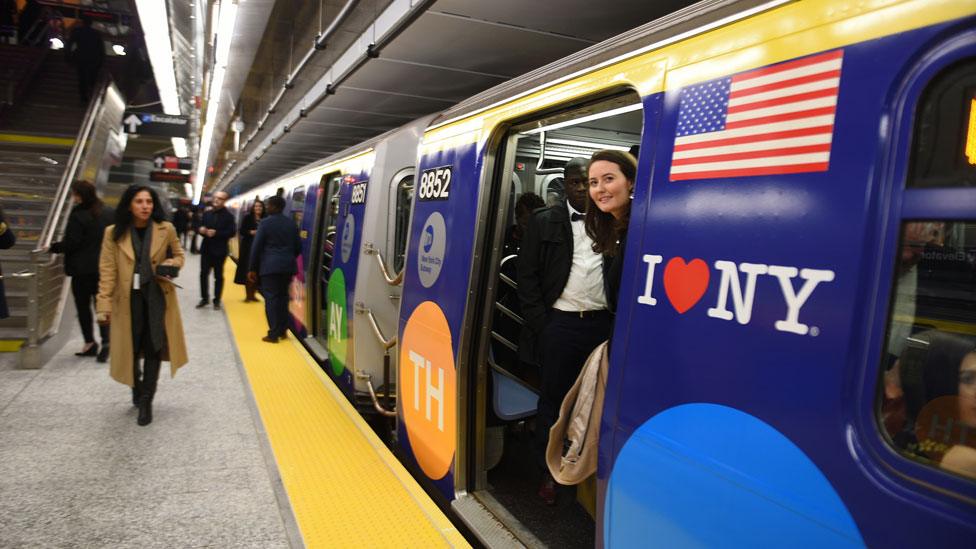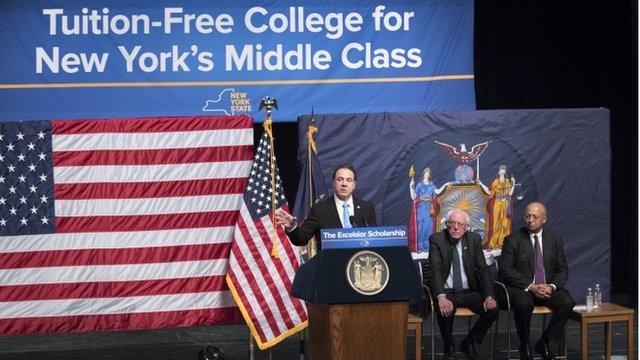New York to scrap tuition fees for middle class
- Published

Young people from a million families are expected to be eligible for the fee support
New York is planning one of the biggest schemes in the world to abolish tuition fees for students.
The US state wants to extend free tuition to middle-class families, as well as the disadvantaged, with young people in almost a million households expected to be eligible.
It will mean children from families earning up to $125,000 (£101,000) per year will not have to pay fees at public higher education institutions, such as colleges of the State University of New York and City University of New York.
Governor Andrew Cuomo, announcing the scheme last week, said he wanted to reduce levels of student debt that were like "starting a race with an anchor tied to your leg".
The New York governor said that 70% of jobs in the state now needed a college education and that tuition fees could not be allowed to remain a barrier.

College students in New York could graduate with much lower debts
"What high school was 75 years ago, college is today," said Mr Cuomo. "College is a mandatory step if you really want to be a success."
Elderly student debtors
The New York proposals will particularly address the anxieties of middle-income families, earning too much to benefit from scholarships for the most deprived, but struggling to afford increased fees.
Tuition fees have risen much more sharply than inflation and student loan debt in the US has outstripped the amount owed on credit cards, standing at $1.3 trillion (£1.07 trillion).

Bernie Sanders (left) launched the scheme with Governor Cuomo
This is not a problem for only the recently graduated.
A report last week from the Office for Older Americans showed that the number of over-60-year-olds still paying back student debt had quadrupled in a decade, with $66.7bn (£55bn) remaining in outstanding loans.
The study raised concerns of elderly people unable to afford repayments being pursued by debt chasers using "aggressive tactics".
But the financial support in New York will not apply to top private universities, where tuition fees can be in the region of $50,000 (£41,000) per year.
And even though the fees in state universities will be covered, students would still face other costs such as accommodation.
The plans estimate that about 200,000 students will take up the fee offer in New York, from the million families that would be eligible.

Making college affordable is an economic necessity for New York, says Governor Cuomo
Governor Cuomo's pledge is a surviving legacy of Hillary Clinton's unsuccessful presidential campaign agenda, which proposed a tuition fee subsidy scheme to be extended across the US.
Bernie Sanders, another presidential candidate who had campaigned on cutting fees, helped to launch the New York fees plan.
He highlighted the economic cost of the US slipping behind in education compared with international rivals.
Falling behind
"If we are going to have an economy that creates the kinds of jobs that we need for our people, we must have the best educated workforce in the world," said the senator for Vermont.
"And here is a truth, which is an unpleasant truth - and that is 30 or so years ago we had the highest percentage of college graduates of any nation on Earth. We were number one. Today, we are number 11."

More stories from the BBC's Global education series, external looking at education from an international perspective, and how to get in touch.
You can join the debate at the BBC's Family & Education News Facebook page, external.

Mr Sanders said young people should be encouraged to achieve as much as possible in school and college - rather than "punish them for getting that education" with high fees.
"It is basically insane to tell the young people of this country, 'We want you to go out and get the best education you can.
'We want you to get the jobs of the future. Oh, but by the way, after you leave school, you're going to be $30,000, $50,000, $100,000 in debt.'"

Children from families earning up to $125,000 will be exempt from fees
The fees policy, if approved by the state's lawmakers, will affect the biggest state university system in the US and a population bigger than many European countries - such as the Netherlands, Greece or Sweden.
And it will mark another stage in the international argument about the cost of higher education and who should pay for it.
Fees up or down?
In England, the government is pushing in the opposite direction, with plans to increase tuition fees to £9,250 from the autumn.
While in contrast, the Scottish Government continues to maintain a policy of free tuition.
A few weeks ago, the Philippines announced the scrapping of tuition fees for state universities, following in the footsteps of Germany, where fees have also been abolished.
But there have been moves in Finland for universities to start charging overseas students, with the fees to be levied on non-EU students from this autumn.
There are also arguments that state subsidies can encourage universities to inflate fees even further, with taxpayers picking up the bill.
Such a lack of consensus means that young people either side of a border can face huge differences in tuition costs.
And Mr Sanders predicted that the initiative in New York, due to be phased in over the next three years, would be copied by other authorities.
"If New York state does it this year, mark my words, state after state will follow,'' said Mr Sanders.